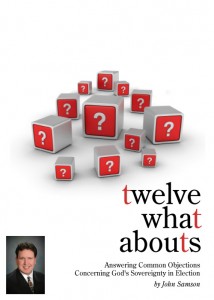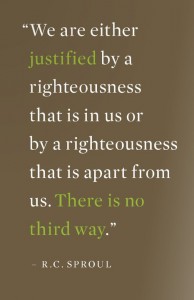 A good reminder from Justin Taylor:
A good reminder from Justin Taylor:
Eight Reasons Why My Anxiety Is Pointless and Foolish
1. God is near me to help me.
Philippians 4:5-6: “The Lord is at hand; [therefore] do not be anxious about anything, but in everything by prayer and supplication with thanksgiving let your requests be made known to God.”
2. God cares for me.
1 Peter 5:7: “. . . casting all your anxieties on him, because he cares for you.”
3. My Father in heaven knows all my needs and will supply all my needs.
Matthew 6:31-33: “Therefore do not be anxious, saying, ‘What shall we eat?’ or ‘What shall we drink?’ or ‘What shall we wear?’ For the Gentiles seek after all these things, and your heavenly Father knows that you need them all. But seek first the kingdom of God and his righteousness, and all these things will be added to you.”
4. God values me more than birds and grass, which he richly provides for and adorns; how much more will he provide for all my needs!
Matthew 6:26-30: “Look at the birds of the air: they neither sow nor reap nor gather into barns, and yet your heavenly Father feeds them. Are you not of more value than they? And which of you by being anxious can add a single hour to his span of life? And why are you anxious about clothing? Consider the lilies of the field, how they grow: they neither toil nor spin, yet I tell you, even Solomon in all his glory was not arrayed like one of these. But if God so clothes the grass of the field, which today is alive and tomorrow is thrown into the oven, will he not much more clothe you, O you of little faith?”
5. The worst someone can do to me is to kill me and take things from me!
Matthew 6:25: “Do not be anxious about your life, what you will eat or what you will drink, nor about your body, what you will put on. Is not life more than food, and the body more than clothing?” [I.e., you still have eternal life even if you have no food; you will still have a resurrection body even if you are physically deprived.]
Luke 12:4: “Do not fear those who kill the body, and after that have nothing more that they can do.”
Luke 21:16, 18: “Some of you they will put to death. . . . But not a hair of your head will perish.”
Romans 8:31-32, 35, 38-39: “If God is for us, who can be against us? He who did not spare his own Son but gave him up for us all, how will he not also with him graciously give us all things? . . . Who shall separate us from the love of Christ? Shall tribulation, or distress, or persecution, or famine, or nakedness, or danger, or sword? . . . For I am sure that neither death nor life, nor angels nor rulers, nor things present nor things to come, nor powers, nor height nor depth, nor anything else in all creation, will be able to separate us from the love of God in Christ Jesus our Lord.”
6. Anxiety is pointless.
Matthew 6:27: “Which of you by being anxious can add a single hour to his span of life?” [Answer: no one.]
7. Anxiety is worldly.
Matthew 6:31-32: “Do not be anxious, saying, ‘What shall we eat?’ or ‘What shall we drink?’ or ‘What shall we wear?’ For the Gentiles seek after all these things. . . .”
James 4:4: “You adulterous people! Do you not know that friendship with the world is enmity with God? Therefore whoever wishes to be a friend of the world makes himself an enemy of God.”
8. Tomorrow has enough to worry about and doesn’t need my help.
Matthew 6:34: “Do not be anxious about tomorrow, for tomorrow will be anxious for itself. Sufficient for the day is its own trouble.”
Lamentations 3:23: “[God’s mercies] are new every morning.”
 (1) Most Christians would be ill equipped to respond Matthew Vines’ “The Gay Debate: The Bible and Homosexuality” YouTube presentation. However, Dr. James White’s does do so here.
(1) Most Christians would be ill equipped to respond Matthew Vines’ “The Gay Debate: The Bible and Homosexuality” YouTube presentation. However, Dr. James White’s does do so here..
 (3) I continue to be very much encouraged by the reaction to my new book “Twelve What Abouts” now out in paperback. At 168 pages, it seeks to provide answers to the most frequently raised objections to the doctrine of God’s Sovereignty in salvation.
(3) I continue to be very much encouraged by the reaction to my new book “Twelve What Abouts” now out in paperback. At 168 pages, it seeks to provide answers to the most frequently raised objections to the doctrine of God’s Sovereignty in salvation.
 “We must have the heathen converted; God has myriads of His elect among them, we must go and search for them somehow or other.” – C. H. Spurgeon
“We must have the heathen converted; God has myriads of His elect among them, we must go and search for them somehow or other.” – C. H. Spurgeon A good reminder from Justin Taylor:
A good reminder from Justin Taylor: At the Council of Trent in the 16th century, the Roman Catholic Church placed its eternal and irrevocable curse on the Gospel, announcing it as actually heretical. I am certain that in the hearts and minds of the delegates at the Council, this was never intended – not even for a moment – but that is in fact what happened.
At the Council of Trent in the 16th century, the Roman Catholic Church placed its eternal and irrevocable curse on the Gospel, announcing it as actually heretical. I am certain that in the hearts and minds of the delegates at the Council, this was never intended – not even for a moment – but that is in fact what happened.